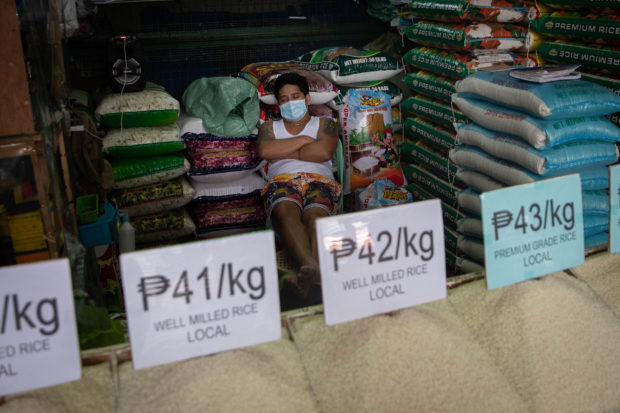
A vendor wearing a face mask for protection against the coronavirus disease (COVID-19) sleeps in a stall selling rice at a public market in Quezon City, Metro Manila, Philippines, January 5, 2021. REUTERS FILE PHOTO
MANILA, Philippines — President Ferdinand “Bongbong” Marcos Jr has approved the recommendation of the economic ministry to extend up to the end of next year lower tariff rates on rice and other food items to help combat inflation, his office said on Sunday.
The modified rates approved in 2021 were due to expire at the end of this year, but an inflation rate running at 14-year highs warranted an extension of the tariff reprieve until Dec. 31, 2023.
That means the tariff rate for imported rice will stay at 35 percent, while the import levies on corn and pork products will remain at 5 percent-15 percent and 15 percent-25 percen respectively, the press secretary’s office said in a statement.
The tariff for coal imports, a key fuel in power generation, will remain at zero beyond the end of next year, but will be reviewed regularly.
“Through this policy, we shall augment our domestic food supplies, diversify our sources of food staples, and temper inflationary pressures arising from supply constraints and rising international prices of production inputs,” Economic Planning Secretary Arsenio Balisacan said in the statement.
At 8 percent in November, consumer price inflation is well beyond the Philippine central bank’s target range of 2 percent-4 percent for this year and the medium term.
Soaring inflation has prompted the Bangko Sentral ng Pilipinas (BSP) to raise interest rates seven times this year and flag more tightening in 2023 to bring inflation back to within its target.
“We are determined to steer the Philippine economy to meet the 6 percent-7 percent economic growth target for 2023,” Balisacan said.
RELATED STORIES
Philippine inflation leaps to 14-year high in November
Inflation, now 8%, deepens insufficiency of current wages